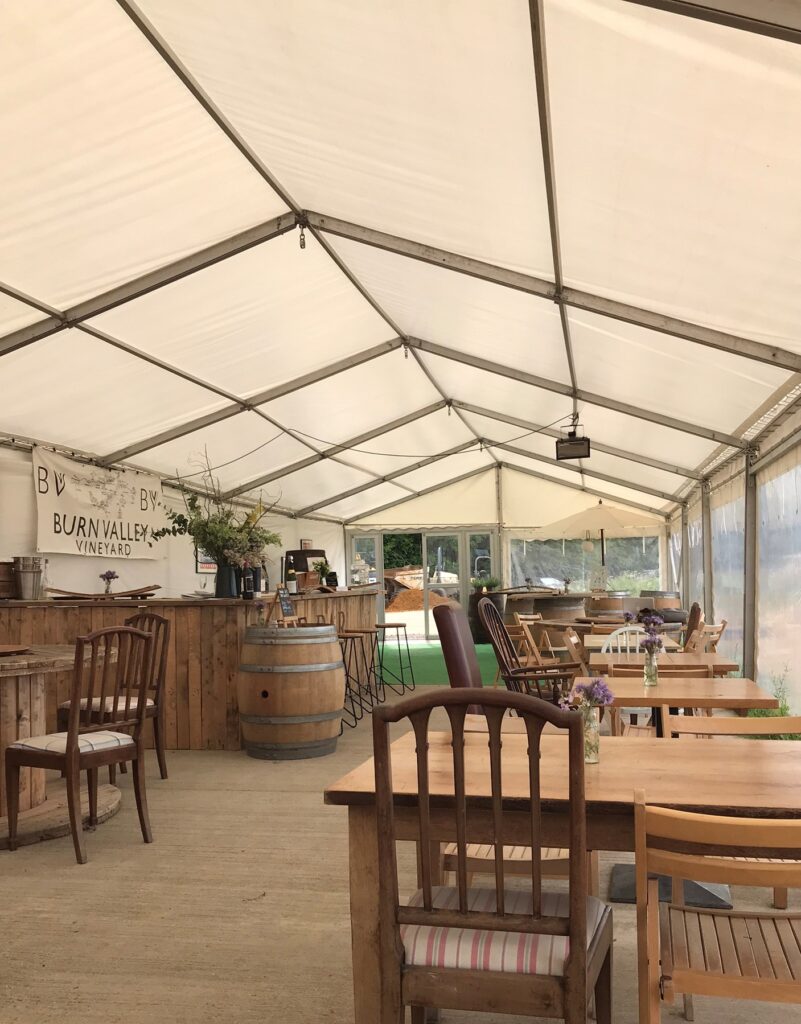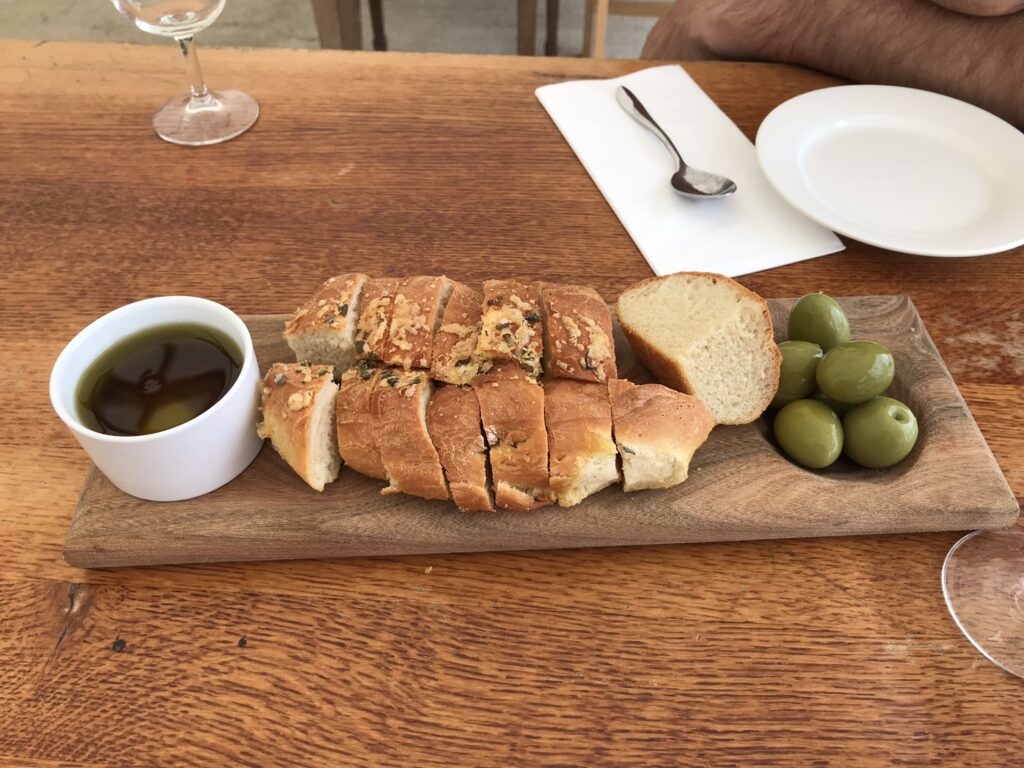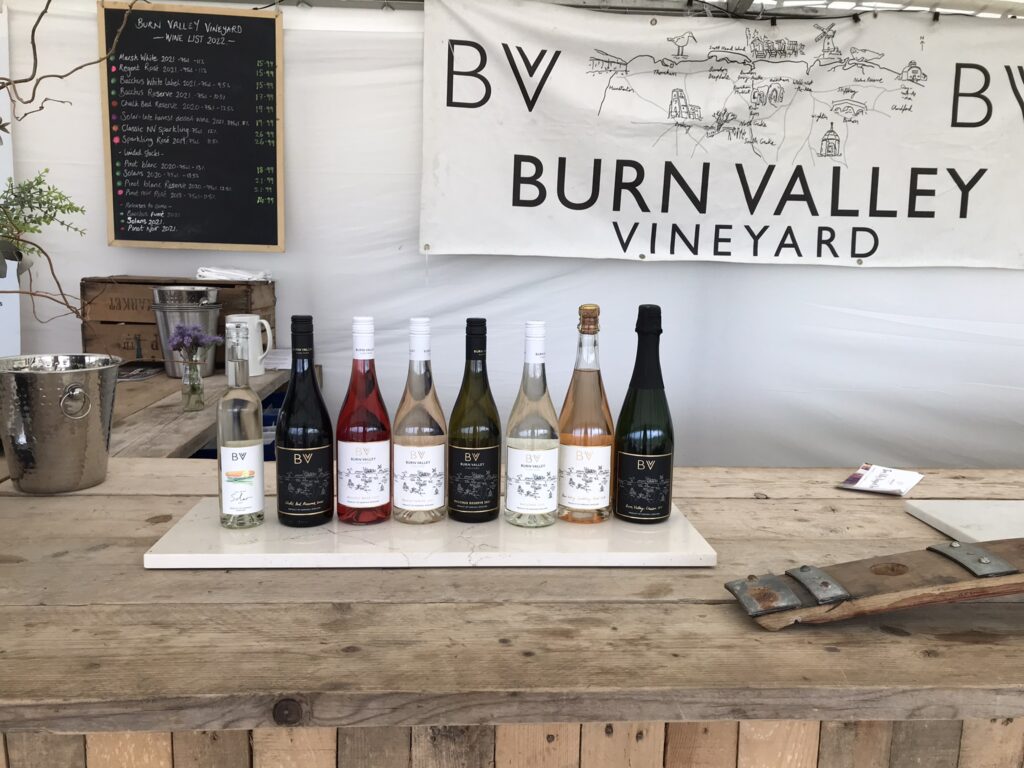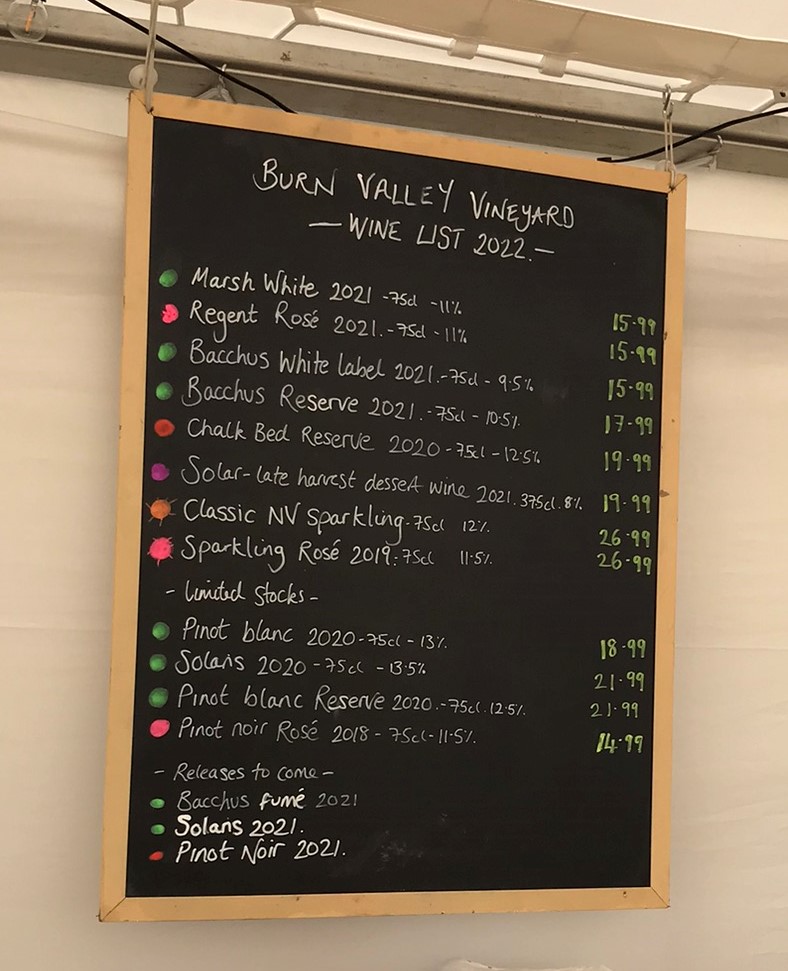www.burnvalleyvineyard.co.uk Burn Valley Vineyard, North Creake, Fakenham, Norfolk, NR21 9LN

Hidden away in beautiful, rural Norfolk we mistakenly drove straight past Burn Valley at first but it was a treat once found! The tasting at this award-winning winery, takes place in a large, covered marquee where we received a warm welcome from the small team of staff. Burn Valley with its 17,500 vines was only established in 2015 but is already making its mark with a wide collection of wines on offer as well as a catering business which hosts evening secret suppers and steak nights (check website for availability).
The experience
We had booked the “Wine tasting with bread, oils and olives” and this cost £25 per person. Sadly I missed that we could have taken a self-guided walk around the vines before or after the tasting and I’ll definitely remember to do that next time we visit.
On arrival we were supplied with a full glass of a delicious Classic NV Sparkling wine and as we sipped this, we found out more about Burn Valley.
The vines are planted on free draining soil with a chalk base – and unusually for Norfolk there are some hills so they are able to take advantage of a Southerly aspect. Burn Valley keeps the vineyard grass-free and stones naturally found in the soil, help to conduct heat and aid ripening (as is also the case in Châteauneuf-du-Pape).
The weather has been good so far this year and the vines are growing well with the potential for a good vintage – unlike last year which was tricky with late frosts. They are currently starting to tuck back the new shoots (to help expose the forthcoming grapes to sunlight and improve air circulation). The work of a vineyard manager goes on all year round!
We were told that Burn Valley has laid down a selection of their wines which they plan to taste over a period of 6 years to see how they develop and mature. The results will help drive decisions as to how they mature the wine in future, but of course this will be weighed up against the quality of the vintage at the time. It was really fascinating to hear how a winemaker has to consider both the past (the harvest vintage), the present (winemaking choices) and the future (via maturation) and brought home to me how skilled the job is.

Chris, the Burn Valley winemaker, hosted the session and was very receptive to answering all our individual questions. There were three other groups on the tour – two of whom had booked the lunch platters which looked beautiful. Our bread was fresh out of the oven and absolutely delicious with its accompanying olives and oil. We were also able to liberally avail ourselves of Burn Valley drinking water, which comes from their own spring and has a soft texture due to the lack of chemicals. This water made for a great palate cleanser in between wines.
The wines tasted

Classic NV Sparkling: although non-vintage I was told this was made from grapes (Chardonny and Pinot Noir) harvested in 2018. The wine then spent an extensive period of time ageing on its lees resulting in a rounded, fuller mouthfeel with toasty notes and a soft, creamy mousse. It is described as “the perfect celebration drink” with which I don’t disagree!
Bacchus White Label: this low alcohol (9.5%) white wine is light, balanced and easy to drink. The aromatic Bacchus grape is widely planted in the UK due to its ability to cope with our cool climate, ripening slowly while retaining its acidity. It is often referred to as similar to Sauvignon Blanc, however Chris (who trained and worked in Germany) likens it more to Riesling.
Bacchus Reserve: is made with grapes which have ripened for longer therefore making for a higher alcohol wine with more pronounced aromas. This wine is made in a pleasant off dry style.
Solaris 2020: this wine was not originally on our tasting list, but Chris kindly arranged for us to try it as well. The wine has been allowed to go through malolactic fermentation (conversion of tart malic acids to softer lactic acid) and then matured in oak barrels.
Marsh White: this interesting wine is made from Seyval Blanc, Pinot Blanc and Schonburger. The latter pink skinned grape gives the wine its unusual creamy colour. The predominantly peachy aromas are balanced with high acidity giving a crisp, refreshing finish.
Regent Rosé: has a very deep pink colour due to the highly coloured Regent grapes and a period of maceration on the grape skins prior to fermentation. This medium bodied rosé has citrus and strawberry aromas.
Chalk Bed Reserve: this deep ruby wine is a blend of Regent and Rondo, which is an early ripening grape with a light but fruity flavour. Burn Valley recommend decanting this wine to allow it to open up and they hope it will age up to 5 years. It has aromas of damson, plum and cedar. If you like Merlot, you may enjoy this wine.
Solar late harvest: this is, I believe, the only dessert wine being made in East Anglia. It is made from Solaris late harvest grapes, which they told me also had a little botrytis (the mould responsible for the concentrated grapes that make famous sweet wines like Tokaji and Sauternes). It is low alcohol with aromas of tropical fruits, honey and caramel. Burn Valley recommend this wine as a good partner with strawberries – which we will try!
Why you should visit Burn Valley

The tasting is a great intro to a wide selection of English wines made with different grapes. It is welcoming and accessible for all – including dogs on leads, children (£5 supplement), and wheelchair users.
Chris is hugely knowledgeable and enthusiastic about experimentation in the winery. Burn Valley also offers great dining options which would make for a fun outing with friends.